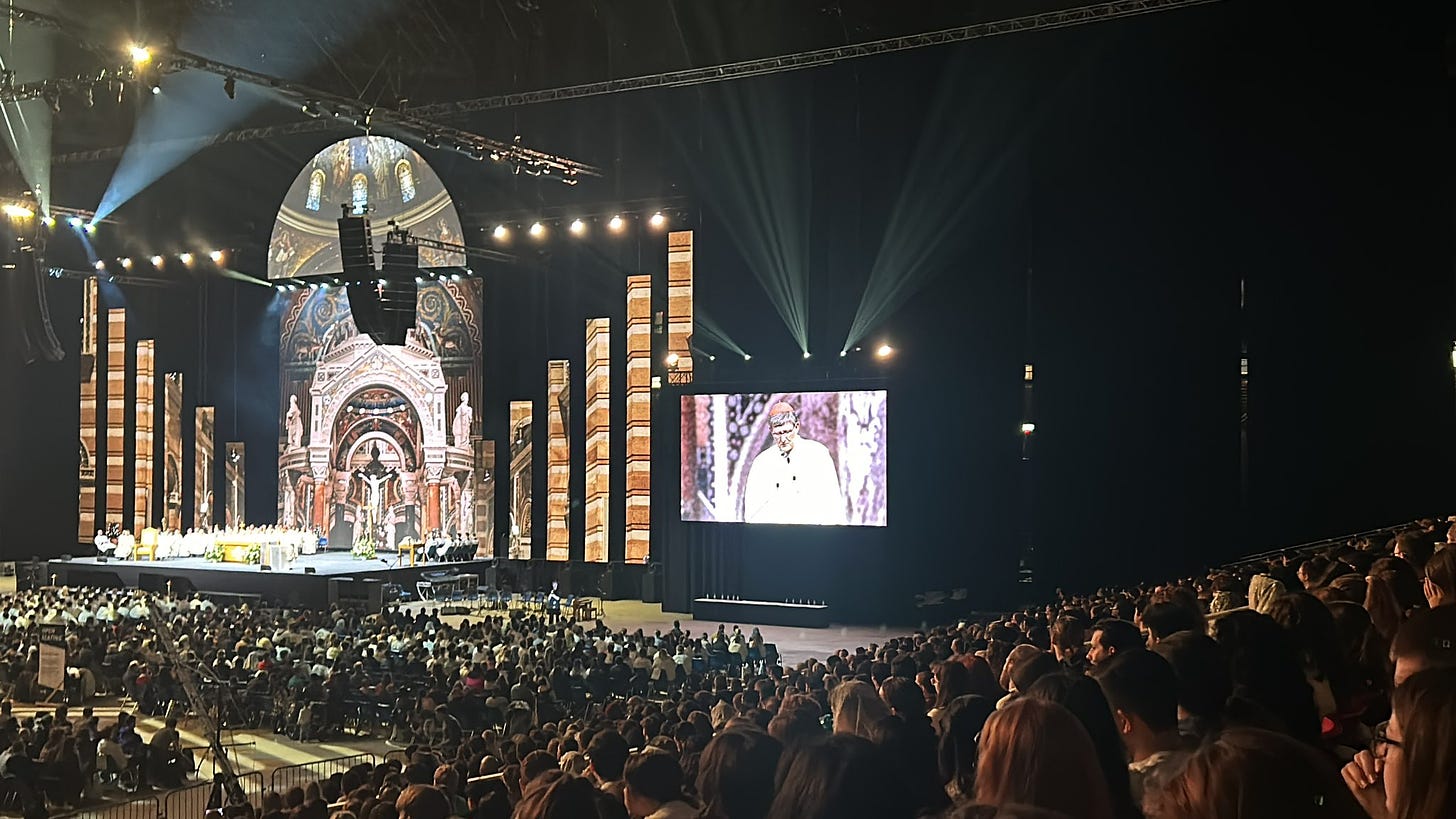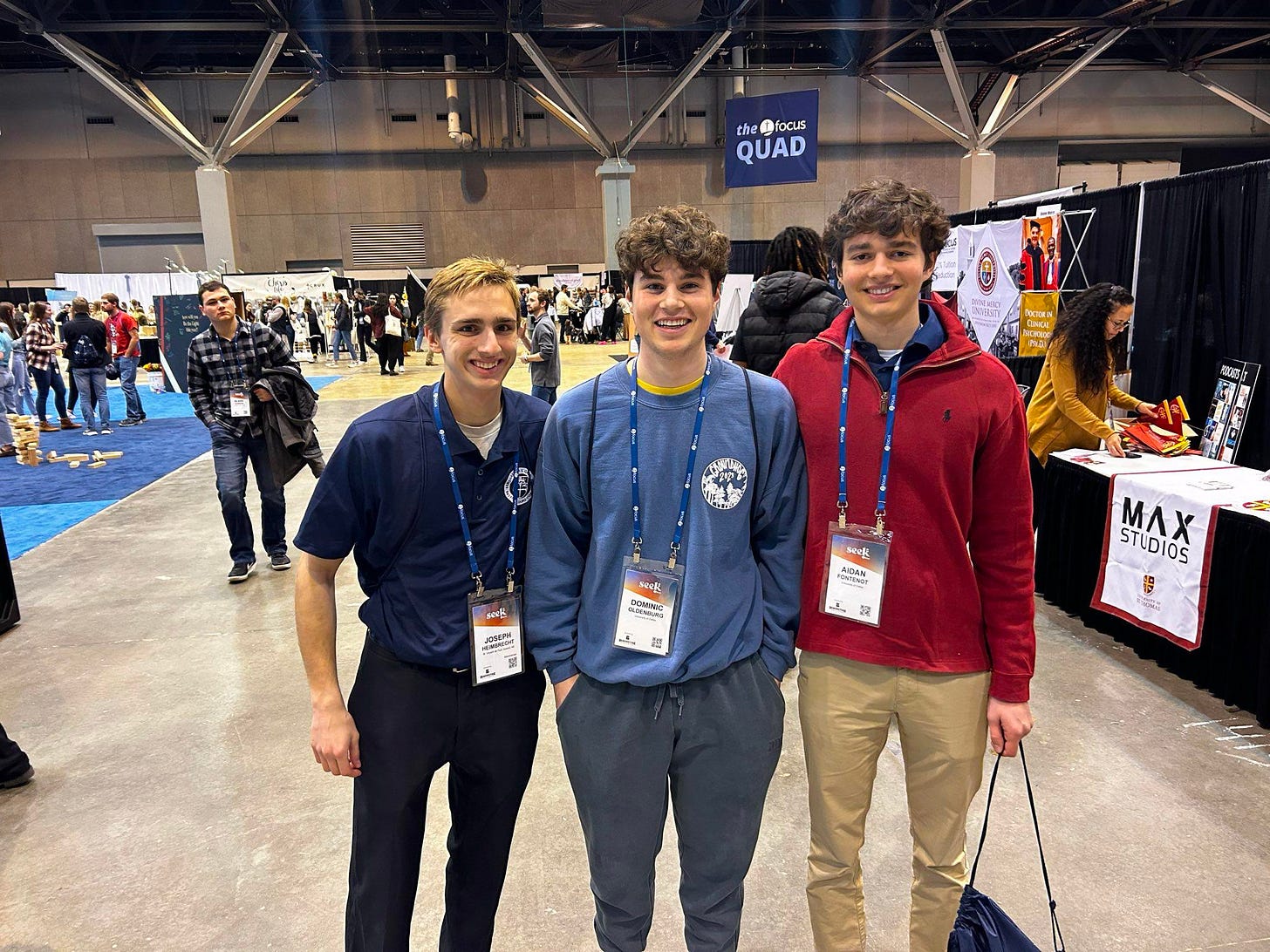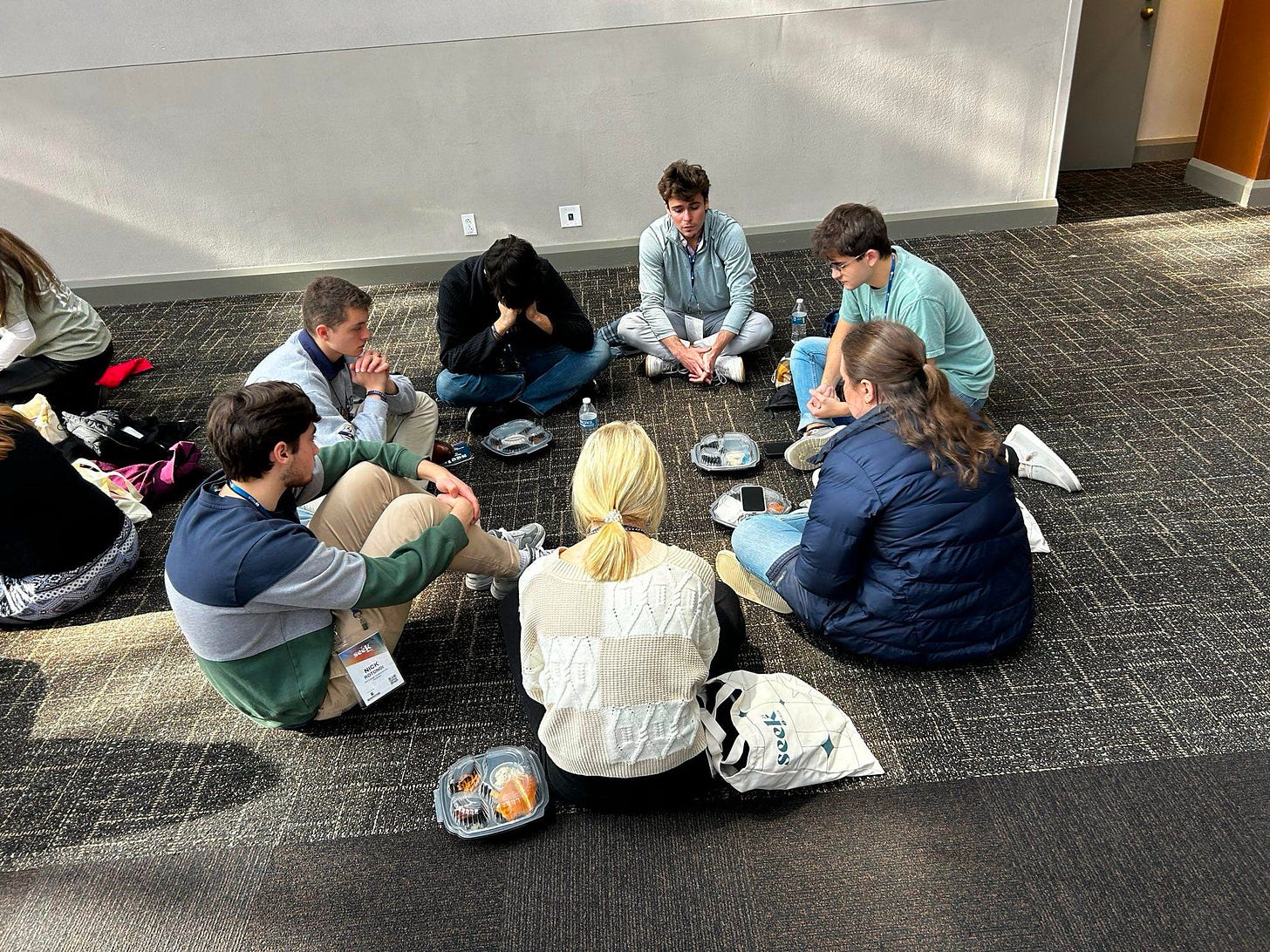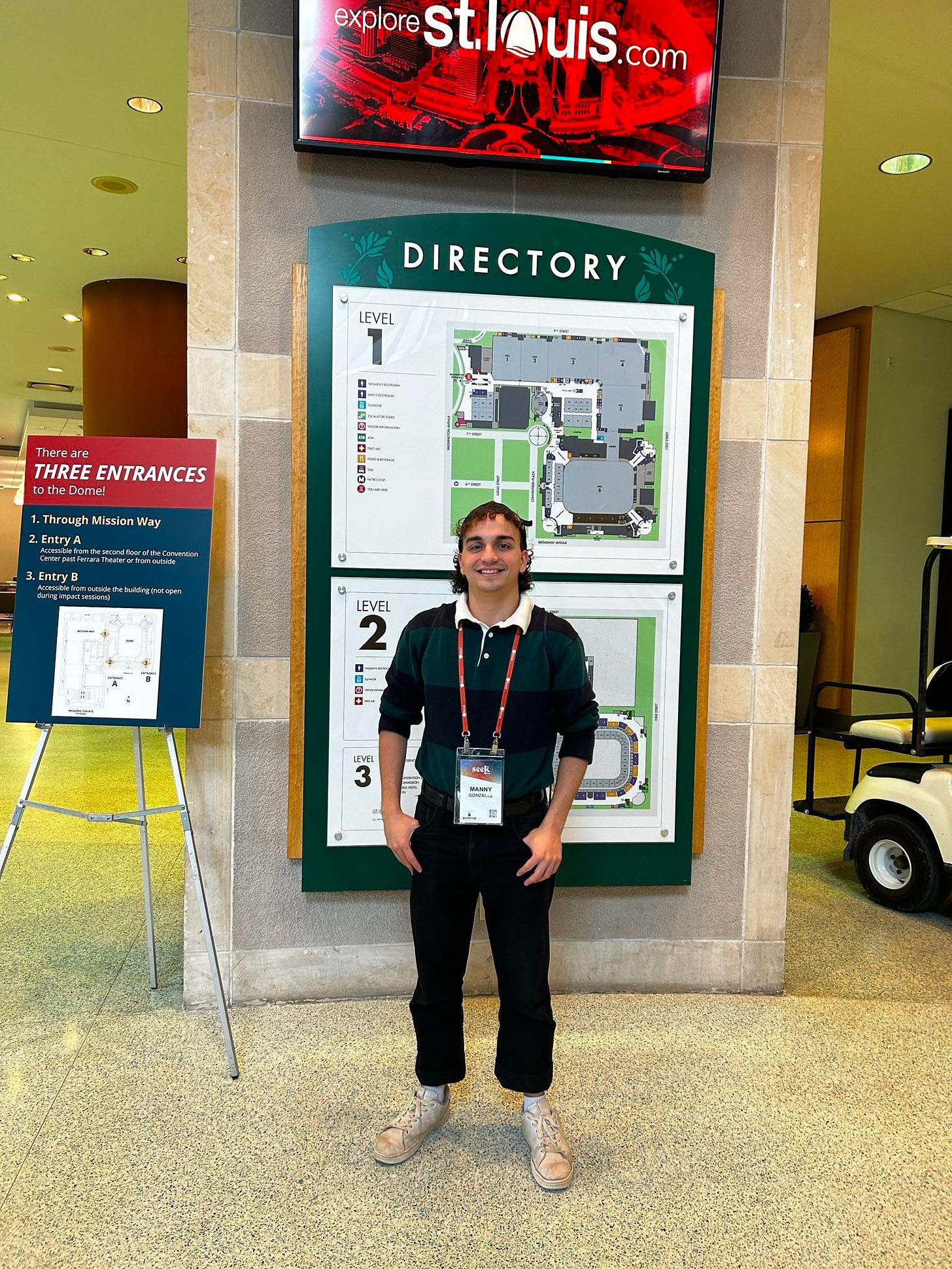
‘He already knows’ - At SEEK, navigating Catholic complexities
How young Catholics think about division in the Church.
Editor’s note: As nearly 20,000 young Catholics — mostly students — gather at SEEK, a massive conference sponsored by campus ministry apostolate FOCUS, The Pillar will feature reporting from Catholic student journalist Jack Figge, who is serving as a ground-level correspondent at the event.

Kathryn Sterns grew up Catholic. But in high school, she decided that she wanted to explore other faiths, to figure everything out for herself, because the Church was, well, messy.
“I wanted to be convicted in the faith for myself. And this led to a lot of exploration because I had a lot of my own doubts and struggles with certain doctrines or dogmas of the Catholic faith,” Sterns told The Pillar.
As a student at the University of Wisconsin-Oshkosh, Sterns found her way back to the Catholic Church by talking with priests, watching Bishop Robert Barron and Father Mike Schmitz videos, and then, she says, encountering the Lord in prayer.
Now, Sterns says, the Catholic faith is the most important part of her life.
“The Catholic faith is a very big part of my life. Well, I shouldn't say that. It is my life,” she said.
As Sterns rediscovered the faith, she soon noticed division and tension within the Church — the theological differences or liturgical disputes, which manifested in online rancor and even division among people she knew.
Indeed, Sterns, like all Catholics, is living through a period of new fault lines in the Church, with division even among bishops over serious issues — and a lot of that spilling out into communities of Catholics, both online and in parishes or Newman Centers.
For Stern, division in the Church is a call to stay informed, and to engage with current events.
“We are the future of the Church,” she told The Pillar.
“The young adults right now, we're going to be the people in 10 or 20 years sitting in the pews with our families, and leading our parishes,” she added
“And so I think it's important that not only are we aware of what's going on in the life of the Church, but we are also well informed and well educated about it.”
This week, Sterns is among more than 19,000 young adults attending the FOCUS SEEK Conference in St. Louis.
Their attendance at an event focused on evangelization and pastoral formation comes amid an era of challenge in the Church, in which U.S. bishops and other Church leaders have been divided over policies, new approaches, and the leadership of Pope Francis.
So how does that impact the young Catholics at SEEK. Some told The Pillar they think it’s important to understand challenges the Church is facing, while others told The Pillar that they aim to keep the focus on Jesus.
Uncovering the truth
Morgan Herring, a recent graduate of the University of Northern Iowa, said that she believes it is important to engage with division in the Church.
“I think it is really important to be knowledgeable about Church politics. If people aren't taught about it, they will never know the truth and will not be able to explain different areas of the Church,” Herring said.
Aidan Fonenot, a freshman at the University of Dallas, told The Pillar that it seems inevitable practicing Catholics will pay attention to ecclesiastical politics.
“I personally think you kind of have to take a side if you want to discover the truth, as there can be only one truth,” Fonenot said.
“It’s so important that we hold on to our morals as a Church and not change them so that we can be a beacon of truth.”
Eveyln Barrera is a young adult from Memphis, Tennessee. With her sister Edith, she leads a Bible study and teaches a confirmation program at her parish.
Evelyn said she pays attention to current affairs in the Church, because they help her to participate more fully in her faith. By engaging with issues in the Church, Evelyn says she is able to participate more fully in her faith.
“There is a phrase in Spanish that is kind of aggressive: Catolico ignorante es un futuro protetante, which says that if you are ignorant as a Catholic, you will be a protestant,” she explained.
"A lot of people are leaving our faith because of confusion, and I think it's important to be involved and aware of what is going on.”
For his part, Fonenot said he hopes that Catholics from different theological perspectives will learn how better to talk with each other.
“I think to a certain extent you can ever fully erase these divisions,” Fonenot told The Pillar.
“You need to know what is true and know the faith well. You can’t judge others based on their differences, but that doesn't mean you can’t have hard conversations with them. What I think would heal the church the most would be discourse on both sides.”

Accompaniment through division
Manny Gonzalez has seen the need for better discourse firsthand.
When he was a young teenager experiencing same-sex attraction, he fell away from the Church, as he struggled to grapple with its moral doctrine.
But Gonzalez said that over time, the Lord led him back to the faith.
Today he is a graduate student at Franciscan University, and he leads a ministry dedicated to serving those experiencing same-sex attraction, he said.
Gonzalez said that he’s learned that helping people “encounter” Christ usually comes before they change their minds about Catholic doctrine.
“We sometimes are so focused on the truth, which is an aspect of love, because love is rooted in truth. But sometimes we're so focused on doctrine and the moral truth behind things that we forget to see the human person in the face,” said Gonzalez.
“My approach — which I hope mirrors Jesus's ministry — is yes, calling others to go and sin no more, calling others higher, but at the same time, doing so in the context of human relationships.”
Sophia Schmidt is a Kansas State University student, who has tried to adopt a similar approach when talking with relatives, especially non-practicing Catholics, about hot-button issues in the Church.
“The main thing that people forget is that the Catholic Church should reflect God’s love. I think a lot of people really overlook that with their bias and opinion,” Schmidt said.
“No matter who you are and who you are talking to, the only way you should approach something is with love and kindness. I think people really get lost in the ‘why do you believe this’ and ‘whats the proof’, questions, but at the root of the why and the how is love.”

‘He already knows’
But young Catholics who spoke with The Pillar said that while they pay attention to Catholic issues, they can’t focus too much on polarization or partisanship in the Church.
“I think if we get too deeply invested in church politics it may sway our love for the Lord; it can make our hearts hard in a way,” said Herring. ”And that’s not the point of our relationship with Jesus.”
Edith Barrera, from Memphis, said that paying too much attention to Church affairs can weigh on her spiritual life. Barrera said she combats that with daily prayer.
“It's very important for me to keep up with my prayer life because, at the end of the day, we're all just looking for the same thing, which is a personal relationship with Jesus,” Edith explained.
“Even though there are divisions, personal prayer reminds me to just keep seeing everyone as children of God.”
Remembering to see every person as a child of God has become hard for Manny Gonzalez in the past few weeks. With the controversial Dec. 18 release of Fiducia supplicans, the Vatican’s declaration on blessings, Gonzalez has seen first hand the difficulty of living a saintly life and navigating the political divide of the Church.
He said that whenever the Vatican or a bishop releases a confusing statement, the best thing to do is to read the document itself and turn to trusted news sources.
“There is a lot of confusion right now around what the churches say. And things that weren't even said in the document quite simply. So I think it's important to actually dive into what the document said and what the Church says in general about church teachings because Catechism is clear,” said Gonzalez.
“So many of us sometimes fall into relying on secular news sources like CNN, which is not the place to learn about the Catholic faith. You have to go to the source, to the documents.”
But there is one solution that Manny has found to be the most helpful in navigating the chaos and complexity that is Church politics — turning to the Lord in prayer. In his own life, Gonzalez said that visiting the Lord in Eucharistic adoration has given him the grace to focus on what matters most.
“People just don't bring their struggles to the Lord. They're afraid to just be honest with the Lord and to tell Him, 'Jesus, I am doubting this teaching, or I'm struggling with this part of the church, or I'm struggling with this leader.’ It's like, dude, go to the Lord. He already knows. So come out of hiding because he already sees you and wants to tell you what to do.”













> “We are the future of the Church,” she told The Pillar. “The young adults right now, we're going to be the people in 10 or 20 years sitting in the pews with our families, and leading our parishes,” she added.
Not only the future of the Church, but also the present of the Church, though this is a little less obvious (here I am thinking about Bl. Pier Giorgio Frassati among other examples. A light is not publicly shown on someone's actions until they have suddenly died.)
I think people need to be aware of what's going on in the wider Church, but understand its just a part of the story, not the story itself. Especially if we're going to be dealing with Catholics struggling with their faith, if we aren't going to talk about these issues, no sweat: someone else will, on their terms.
But at the same time, we need to realize that there's more to the faith than the tensions. There's also the dynamism of encountering Christ, the blessings he gives your everyday life. There's the interactions families have, the encountering in the sacraments, daily prayer, etc. Events can intrude on your life, or through prayer, preparation and understanding, events can help shape your life. How events interact with your life depends on you and your faith.